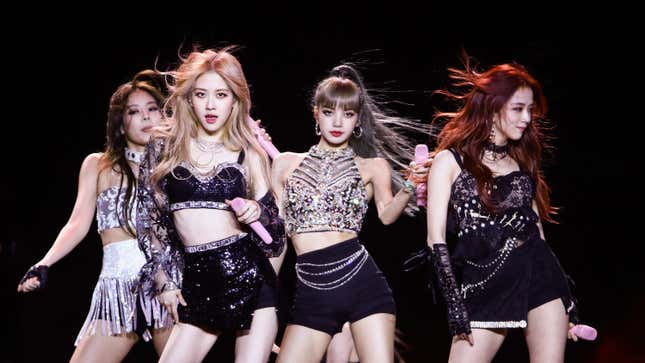
Image: Getty
NEWARK, NJ — A few minutes after the eight o’clock hour, the Prudential Center darkened, illuminated only by pale pink, heart-shaped glow sticks purchased by fans minutes before lights out. Incidental music reverberated from surrounding speakers, and then quickly cut for fireworks, flames, a spacey, theremin-esque synth, and the silhouettes of BLACKPINK rising on platforms from beneath the stage. The girl group, comprised of singer/rapper/dancers Jennie, Rosé, Lisa, and Jisoo, launched into their onomatopoeia hit, “DDU-DU DDU-DU,” and the crowd shot up from their seats and mimicked their meticulous movements. When Rosé and Lisa reached their collaborative declaration of “뜨거워 뜨거워 뜨거워 like FIRE” in the song’s bridge, more pyrotechnics ignited around them, all within the first three minutes of their performance. In that moment—and judging by the euphoric reactions of the people around me on Wednesday night, including an elementary school-age girl whose mother taught her the word “surreal” to describe what she was experiencing at her first concert ever—BLACKPINK felt like the most famous people on the planet.
Surely, they’re not, but they are the most ubiquitous girl group at this moment, popular enough to sell out two nights in a giant arena that sits in the shadow of a New York City skyline, and to do so without an opener. Instead of featuring another K-pop act on their label, YG Entertainment, early attendees were delighted by BLACKPINK music videos played on a repetitive loop. In that way, it felt like the only group fitting enough to open for them was themselves.
BLACKPINK is refreshingly massive. Their music videos are a cacophony of concepts, layered, vibrant, bright, with the overwhelming stimulation of EDM. Sonically, they’re all over the place, but never without cohesion. And that is largely due to the elephant in the K-pop room: stylistically, their biggest hits pull almost exclusively from black music like trap, hip-hop, and R&B. There are a few exceptions; “Stay” (from the Square Two EP) centers around a soft harmony and a harmonica that is early Taylor Swift by another name. There’s also their bubblegum Euro-pop single, “As If It’s Your Last.” Far and away, though, their reference points are found in artists like Nicki Minaj. (During the live show, Lisa did a dance break to Minaj’s “Good Form.” If it wasn’t for the high production value, it would feel like karaoke. Drag is probably the better comparison.)Whatever the case, it seems to do well for them. Their songs are undeniably well-constructed, apparently enough to distract from any inevitable conversations of appropriation versus appreciation. Maybe that’s more indicative of the lack of critical writing around K-pop in Western journalism than anything else.
Even so, the current position of the mega-popular girl group in mainstream music is precarious at best, which makes BLACKPINK’s recent success all the more interesting. The 2010s have failed to produce its own band on par with the Spice Girls or Destiny’s Child like the decades that proceeded it. If there’s any act even somewhat comparable to either, its The X Factor-born Fifth Harmony, but even they are more Danity Kane than any act with real resonance—and a large chunk of the population is more familiar with Camila Cabello’s solo career than anything Fifth Harmony did together. Like Justin Timberlake in *NSYNC before her, she managed to eclipse the act that brought her fame.The K-pop girl groups before BLACKPINK have done something similiar without having to leave: Girls Generation’s Jessica Jung and more recently, Tiffany Young of the group, and 2NE1’s CL have all experimented with solo careers, none of which have completely blown up stateside, but have definitely made a splash: Young collaborated with Babyface; CL teamed up with Ariana Grande and Justin Bieber’s manager Scooter Braun and collaborated on singles with the Black Eyed Peas, Diplo and Skrillex. Last year, BLACKPINK’s Jennie released “SOLO,” which she performs live at group shows—in that way, fans are given the image of individual artists without a breakup. It’s the best of both worlds, and one of the many ways K-pop artists differ from past American pop acts.
As far as collaborations with Western artists go, BLACKPINK has tip-toed into that world, too, like working with Dua Lipa on “Kiss and Make Up,” a song which the English singer made a surprise appearance to perform in Newark on Wednesday night.
K-pop is more than a genre; most accurately, it’s a cultural movement. There are limited sonic similarities across K-pop acts, other than the fact that most groups sing bilingual hits in Korean and English for crossover appeal without having to completely pander to capture both audiences. It is a movement because K-pop has found success in its short 27-year existence by altering the interest of international markets—not by attempting to sell a diluted version of what has worked, historically, back to them. For that reason, attempting to predict the legacy of a group like BLACKPINK is impossible. Will U.S. markets only back one K-pop girl group at a time? Or is BLACKPINK widening the opportunities for other groups the same way BTS has assisted in ushering in the successes of a group like NCT-127?
Two days before I saw BLACKPINK perform, another girl group, the nine-member TWICE, dropped their single, “Fancy.” It became the seventh biggest debut on YouTube, just behind BLACKPINK, BTS and Psy (never doubt the ubiquity of 2012’s “Gangnam Style.”) Will they eventually supplant BLACKPINK? Or is there finally room for multiple girl groups at the top? Judging by the earth-shattering hollers in Newark, space could be made.